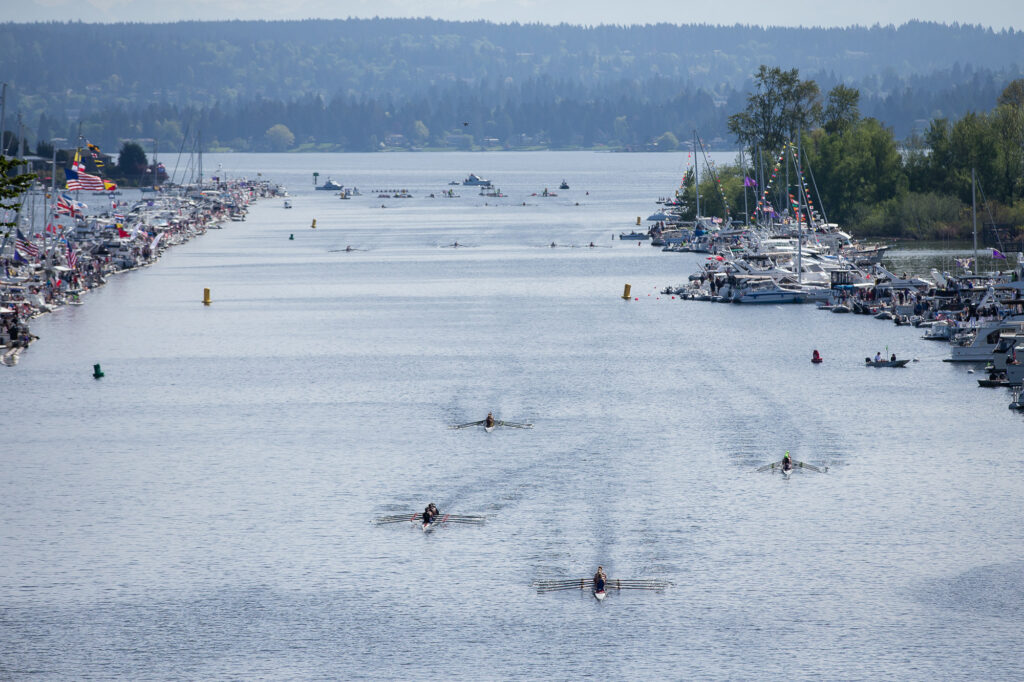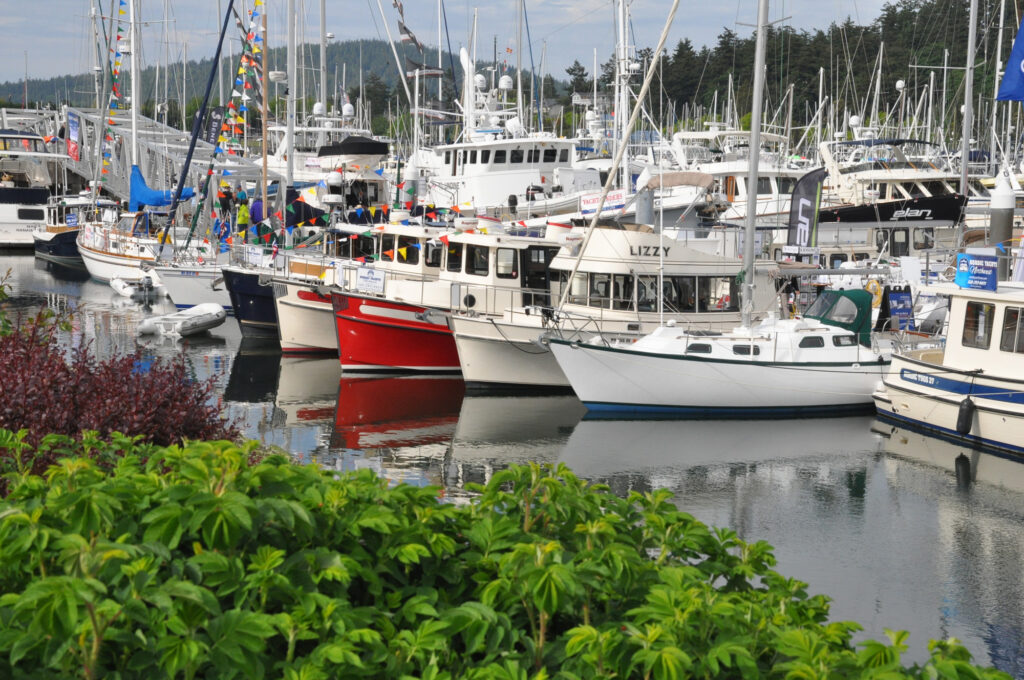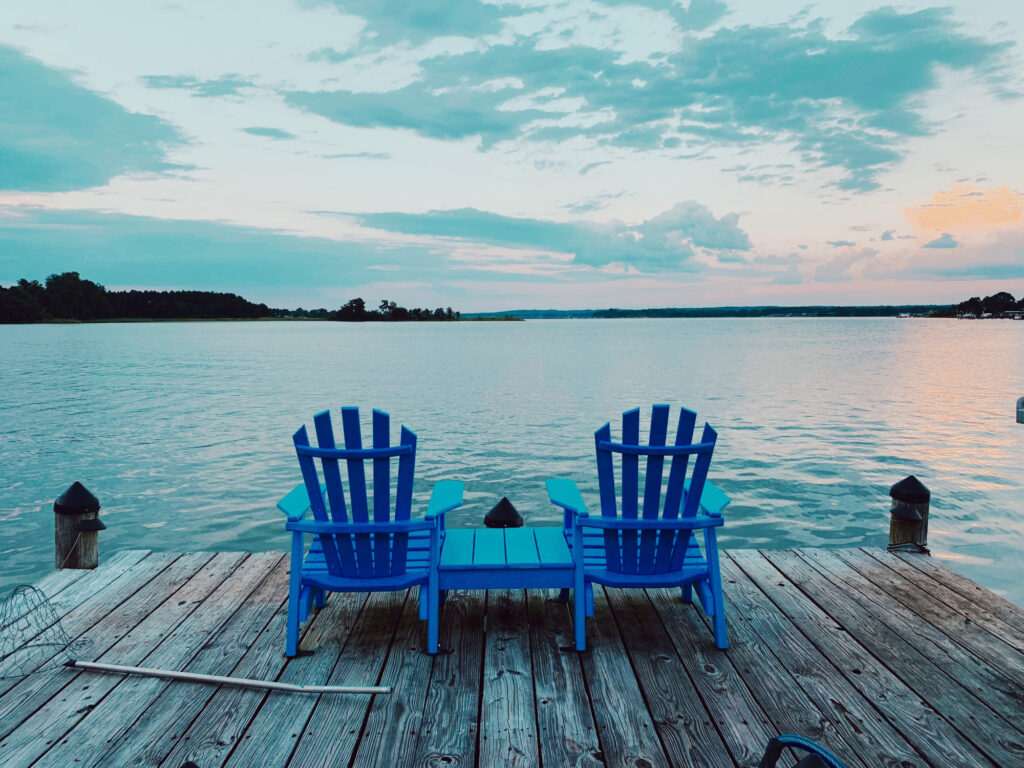
[ boating season begins ]
Spring For the Fences! Opening Day Is Upon Us
With its baseball theme of “Game On,” the Seattle Yacht Club (SYC) is ready to throw out the first pitch of the recreational boating season. Taking place on May 6, SYC’s Opening Day Parade, party, and log boom gathering, along with the 37th Annual Windermere Cup Regatta, featuring a notable visit by a racing team from Down Under, are quite the lineup.
University of Washington Rowing, along with Windermere Real Estate, will host the legendary Australian National Team, long a major force in eight-oared international rowing competitions. Most recently, the Aussie men’s team took third place in the 2022 World Rowing Championships, while the women finished fifth in the world. The women’s team from Australia also achieved fifth place in the 2020 Tokyo Olympic Games, while the men took sixth. This Windermere Cup will be the third appearance by the Australian team, which was also here in 1988 and 1997. To date, UW and Windermere have hosted more than 15 nations over the 36-year history of the regatta. Facing the Aussies this year will be a strong UW Husky roster; the UW men’s team has won the Windermere Cup 26 times in 35 attempts, while the UW women have won 25 out of 35.
At noon, the Opening Day Parade will begin, with dozens of powerboats and sailboats cruising past the log boom on the Montlake Cut to salute SYC Admiral Lance Rummel, Admiralette Nicole Wilkin, and Vice Admiral David Sanford. At the end of the parade, a trophy presentation will take place on SYC’s lawn to reward the boaters in the parade for various superlatives such as best youth-sponsored vessel or best dressed or best themed boat.
Together, the Windermere Cup and Opening Day celebration have grown into “one of the largest free community events in Seattle,” said OB Jacobi, president of Windermere Real Estate. “With thousands of competitors and spectators coming together at such a spectacular venue, it’s a celebration unlike anything else.”
Several family-themed activities will be available for kids, including a bouncy house, “build a boat” station, a photo booth, and the Dawg Pack student section, providing prime access to view races and the parade. The regatta will also have food and drink vendors on the north side of the Montlake Cut, west of the Montlake Bridge.
On May 5, the Friday night before Opening Day, all of the Windermere Cup crews will race in the annual Twilight Sprints, a race from the regatta’s finish line to the eastern end of the Montlake Cut. Afterward, the annual “Party at the Cut” celebration begins at 6 p.m. near the UW Waterfront Activity Center, featuring live music, food trucks, drinks, and games.
For more details on hours, special events admission, and parking for the Opening Day merriments, please visit either: seattleyachtclub.org or windermerecup.withwre.com.

[ enjoy the show ]
Anacortes Show, Trawlerfest Pair Up Again
As the Opening Day celebrations for the boating season begin to ebb, the party will shift to the Anacortes Boat & Yacht Show, where the Northwest Marine Trade Association (NMTA) is again partnering with Trawlerfest on the event that runs from May 18-20.
The main portion of the Boat & Yacht Show’s nearly 200 in-water displays will be located at Cap Sante Marina, but additional boats can also be viewed on land in nearby boatyards and dealers, which can be accessed via a free shuttle service during the show. Attendees can also visit shoreside displays of boating accessories, services, and trailerable boats adjacent to the Cap Sante Marina main entrance.
As was the case at last year’s NMTA show, the Anacortes Boat & Yacht Show will coincide with the five-day Trawlerfest conference, which will begin two days earlier than the Boat & Yacht Show. Trawlerfest will offer more than 30 in-depth educational seminars across five days from May 16-20, covering such topics as sailing the “Great Loop” of the Eastern U.S., Mexico’s “Little Loop” route, the Pacific Coast of Central America, and the Inside Passage. Also, town hall-style Q&A sessions will be held about various wide-ranging topics suggested by the audience.
Prices for the Trawlerfest sessions start at $65 per seminar and will feature some of leading experts in the maritime industry, including Mike Beemer, John Clayman, Jim Merrick, Jeff Merrill, Pat Rains, Kim Russo, Bob Sweet, and many others. Tutorial session topics at Trawlerfest will include boat-handling, anchoring, deepwater cruising, equipment maintenance, course charting, weather tips, handling medical emergencies, boat financing, and use of the latest apps and navigational electronics.
The combined Anacortes shows are expected to draw thousands of attendees to view hundreds of new yachts from more than 75 exhibitors. Last year, NMTA said, the event was attended by buyers from 34 different states. This trend of growth for marine shows is predicted to continue post-pandemic, according to a recent NMTA survey, conducted by Bellevue-based GMA Research.
For more information on Anacortes Boat & Yacht Show hours, TrawlerFest registration, and other planned events, please visit: anacortesboatandyachtshow.com. (Also, be sure to stop by the Northwest Yachting magazine booth and say hi!)

[ moving maritime forward ]
Fourth Wave Comes Ashore for Maritime Blue
The Maritime Blue Innovation Accelerator program will award seven more startup maritime-oriented companies with business-planning assistance and mentorship, some of which are based in Washington state. This latest list of “cohort” companies is the fourth iteration of the accelerator program, which was launched in early 2020.
The accelerator, developed by Washington Maritime Blue, is a four-month, mentor-based program that brings together experts from Washington, the Northwest, and beyond to teach business skills, provide startup advice, and connect companies with local and global advisors. The program also helps each cohort scale-up their ideas, understand legal considerations about startups, begin marketing programs, and learn about potential investment, financing, and other business opportunities ahead.
Two of this year’s startups are both based in Bellevue: CargoCheck, a cloud-based software platform that helps manufacturers manage and deliver bulk and packaged cargo to customers, and Gybe, described as “a work-day platform for frontline and desk-less workers.”
One of the accelerator startups of particular interest to recreational boaters is Dockshare, which could be described as the “Airbnb of boat docking.” Dockshare is an app-based service that connects private dock owners and marinas with boaters who wish to rent available unused dock space nationwide. While Dockshare is based in Baltimore, MD, it is rapidly expanding across the country, and as of press time, has several rental options available in the Northwest region.
Other companies rounding out the cohort list include:
- Atargis Energy (Pueblo, CO): A power generation company seeking to capture the energy of ocean waves and convert them to baseload electricity at a cost of approximately $0.06 per kWh.
- Berkeley Marine Robotics (Oakland, CA): A developer of small, low-cost, autonomous underwater robots that perform hull inspections, assess biofouling from invasive species, and reduce maritime fuel use caused by friction from the hull growths.
- HyperKelp (Encinitas, CA): A maker of solar-powered, floating Kelp Smart Buoys that can transmit acoustic, photographic, video, and other real time sensor data to any desired location on the Earth’s surface.
- qualiTEAS (St. John’s, Newfoundland): A Canadian engineering firm that provides subsea corrosion inspection services using optical spectroscopy on a wide range of maritime assets.
Over the next few months, these startups, in what is being called the accelerator’s “fourth wave,” will participate in global networking events and mentorship opportunities to develop their ideas. “These companies are all ready for venture capital and are poised for significant economic, environmental, and community impact,” says Joshua Berger, CEO of Maritime Blue.
The program will now offer these startups programming and mentorship assistance, as well as access to a cluster of industry leaders, research institutions, public agencies, and community organizations, which can help provide “a pipeline for capital investment,” Berger said.
The Washington Maritime Blue is a nonprofit strategic alliance formed to promote innovation and sustainability in support of an inclusive maritime businesses, collectively known as the blue economy. The organization is a partnership between industry, public sector, research and training institutions, and community organizations, as well as the Port of Seattle.
For more information on the Fourth Wave cohorts, the Maritime Blue Innovation Accelerator program, and links to events, visit: maritimeblue.org.
[ protecting marine habitats ]
WA Sea Grant Secures Green Project Funds
The Puget Sound National Estuary Program’s Habitat Strategic Initiative allotted $1.59 million in funds in March for three new projects associated with the Washington Sea Grant (WSG) program. The projects will address important green issues that will affect the Northwest region, including sea-level rise mitigation, management of invasive species proliferation, and shoreline restoration efforts.
WSG, a partnership between the Washington Department of Fish and Wildlife and the Washington Department of Natural Resources, is leading the two projects on sea level rise and invasive species eradication and is a partner with the University of Washington School of Aquatic and Fishery Sciences on shoreline restoration.
To monitor sea-level rise, the initiative will provide $798,785 for WSG to implement the second phase of its project to assess seawater intrusion vulnerability across 111,000 parcels in the Puget Sound region. The new phase will expand the area being studied westward to the mouth of the Strait of Juan de Fuca, recalculate the potential sea level exposure for the entire study area, and publish the results online in an interactive format. The results of the project will be used to formulate necessary habitat restoration, land use, and hazard mitigation efforts to combat environmental problems in the future.
Another WSG project to protect coastal habitats from the spread of the invasive European green crab will receive $794,789 in grant money, to be used for early detection, management, and monitoring of the crab’s encroachment across Puget Sound. The omnivorous green crabs are particularly aggressive to local habitats, disturbing native species by burrowing deeply into the sea floor.
In addition to paying for its early monitoring network, the WSG Crab Team funds will help provide scientific expertise in the form of shoreline surveys for crab molts and enhance public engagement with the problem. The project will also improve the systematic, long-term monitoring of crabs and other invasive species in often under-monitored Salish Sea estuaries and nearshore habitats.
Finally, the joint WSG/UW project to evaluate shoreline restoration and protection efforts will receive $797,256 in grant funds in support of the Shoreline Monitoring Database. The team, led by Jason Toft of UW’s School of Aquatic and Fishery Sciences, will expand the number of monitoring locations and types of fish and wildlife habitat to be studied. Information collected for the existing database will be used to help improve future habitat protection and restoration efforts.
This work will increase the spatial scale of additional restored and protected shoreline sites and allow for more analysis of their proximity to urban development. Monitoring of these sites will continue for a period of 10 years to determine long-term trends.
The overall Habitat Strategic Initiative is currently investing a total of $14 million in 25 projects to improve Puget Sound habitat recovery projects. Some of these projects include the restoration of habitats for eelgrass, kelp forests, floodplains, and estuaries in the Salish Sea. Others will provide incentives to private landowners to protect habitat along shorelines and streams and in working farms and forests, as well as distribute information to increase resiliency for people, businesses, and habitats threatened by climate change.
For more information on the WSG program and the various projects impacted by the new funds, visit: wsg.uw.edu.